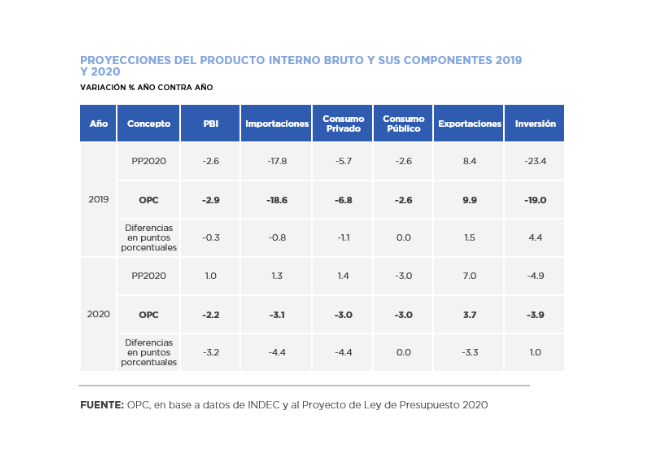The Argentine Congressional Budget Office (OPC) made its own projections for next fiscal year on the assumption that there will be no changes in the current policy.
The OPC estimates for 2020 a primary deficit of AR$154.91 billion (-0.5% of GDP), which contrasts with the surplus of AR$250.93 billion (+0.8% of GDP) projected by the 2020 Budget Bill. The financial deficit will reach AR$1.36 trillion (-4.3% of GDP), higher than that projected in the Budget Bill of AR$786.17 billion (-2.5% of GDP).
These discrepancies are the result of different macroeconomic assumptions, with an impact on the effective level of resources and their allocation between national and provincial jurisdictions.
- The OPC forecasts a 2.9% drop in the Gross Domestic Product for 2019 and a 2.2% decline for next year, which contrasts with the 1% increase included in the Bill under parliamentary analysis.
- The nominal exchange rate and inflation rate for 2019 are projected to be higher than those included in the Executive Branch’s proposal. The annual average dollar rate is expected to be AR$69.3 and the Consumer Price Index 46.4%.
- Total tax resources are expected to fall in real terms in both 2019 and 2020, although at different rates. While for this year a reduction of 4.2% YoY is projected, in 2020 the estimated contraction would accelerate to 5.8% YoY.
- The decline in terms of GDP of Social Security Contributions due to the increase in the non-taxable income for employer contributions, which implies fewer resources for the national government, stands out.
- The loss of momentum of Export Duties (main factor for the growth of tax revenue during 2019), and the regulatory amendments to Income Tax and Employer’s Contributions explain part of the setback.
- The first half of the year will account for 73% of total debt payments and gross financing needs for next year are estimated at the equivalent of 17.8% of GDP.
- The adjustment based on the mobility formula would be 51.30% throughout 2020 and would be applied to pensions, family allowances, AUH (Universal Child Allowance), non-contributory pensions and other social benefits.
- The projection of personnel expenditures considers applying the salary policy implemented during 2019.
- The amount projected for electricity subsidies is based on the policy defined in the Budget Bill under which users assume 63% of the wholesale cost of electricity generation, and as for natural gas, import volumes and prices are similar to those of 2019.

